The South Sudanese storyteller: This is what life is really like for refugees
Most of what we know about conflict we see on TV and in movies. Malish James, who has hopped from refugee camp to refugee camp since fleeing South Sudan as a child, knows what it’s like first hand. Now he’s telling his story to the world
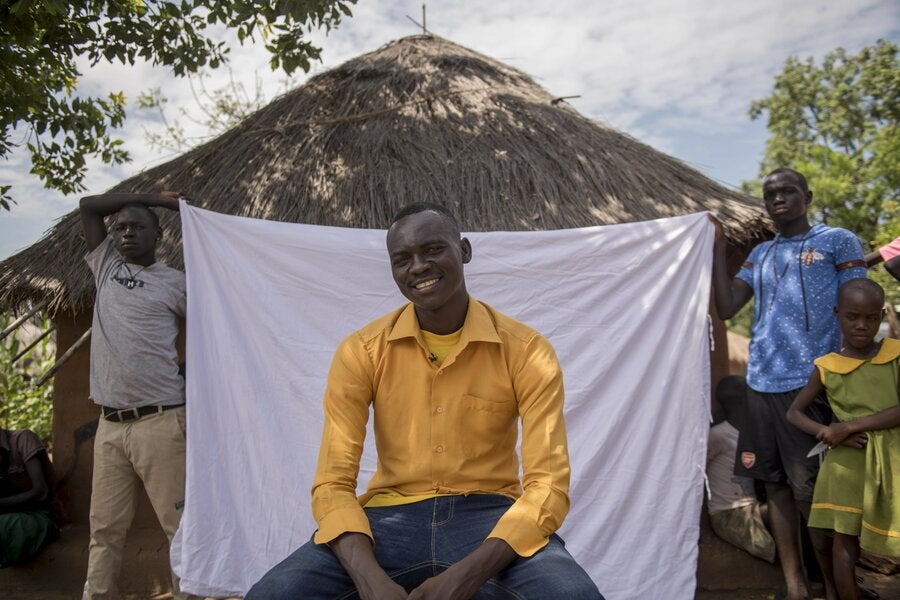
On the evening of 6 January 2000, my uncle Christopher Luke took me from my mother. I was only 11 years old. My mother walked with us a little of the way until we came to the River Luku where she said goodbye. She hugged me and through her tears told me, “My son, go. You will always remain in my heart. We will meet again in the nearest future.”
We left her standing just near the bridge. After walking a few hundred metres I turned to look behind us and she was still looking after us. Our eyes met and she waved to me.
We had been living in Ataki refugee camp in the Democratic Republic of Congo. My family fled from the Sudanese county of Maridi when I was only four years old because of war.
I can remember very little of that journey. I remember my parents struggling to carry their luggage and the children. I was on my father's shoulders. I remember my father carrying me under a big tree and cutting a vine called alanga in the local language.
He held me so I could drink some juice dripping out of the cut in the alanga. I remember walking through a thick forest and being scared at night, hearing the sounds of wild animals making noises just very near in the forest.
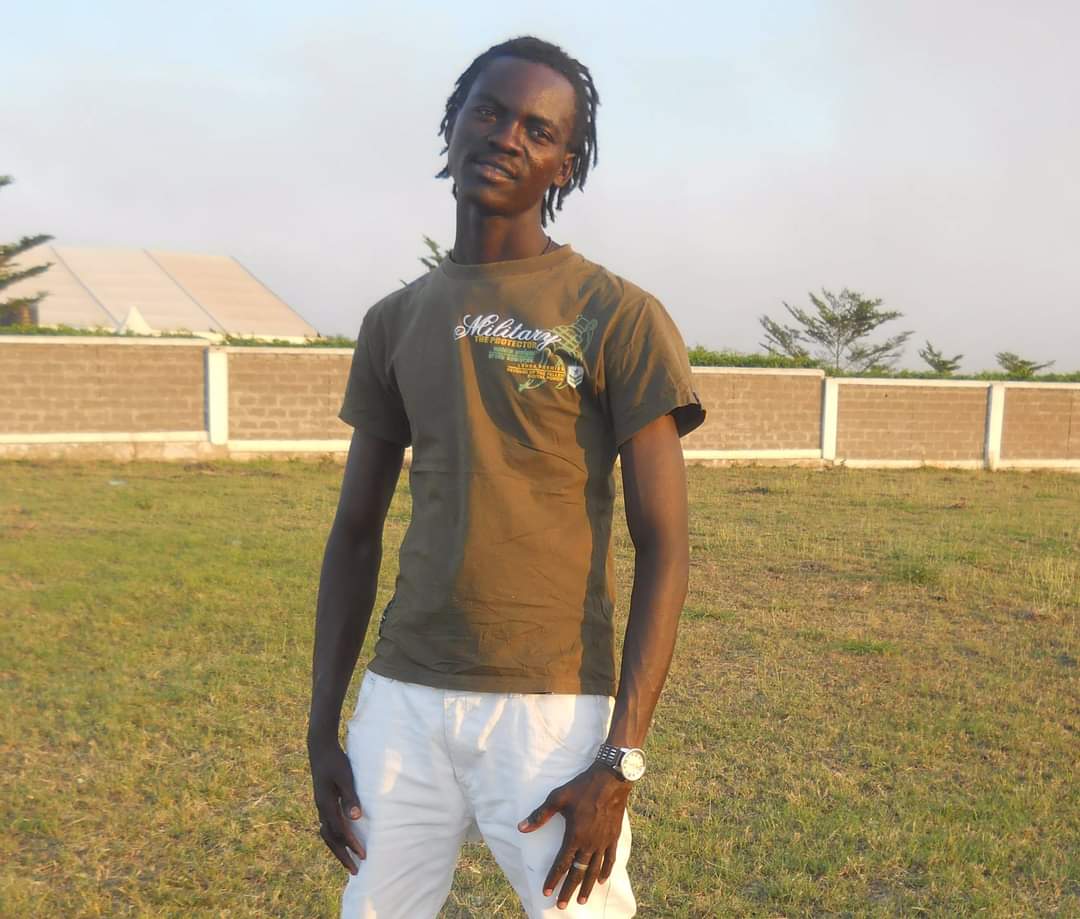
We were picked up by UN officials on the border with the Democratic Republic of Congo and they took us to Ataki refugee camp. At first life was hard. My mother had to grind maize on a stone for us to have a meal every day.
That was the only food we had along with beans and cooking oil. At first there was no school for us children but after some time they opened. I caught a serious sickness that almost killed me. My mother took me to the native doctor who cut my body with a razor blade. The treatment worked and I got better.
Even when we lived in DRC we did not completely escape the conflict. The SPLA (South Sudan People’s Defences Forces) would come over the border into the Congo looking for soldiers who had deserted. We would get warnings and go and sleep in the bush. But one time we were sitting around the fire and soldiers came arrived. We were scared. They took all the adult men and caned them and shouted at them, asking if they were soldiers.
My uncle knew how far we had to walk but he tricked us, telling us that the place is nearby and pointing out some distant trees, saying that just behind that tree we would reach our destination
I can remember many nice times I had with my mother when I was growing up. My mother loved me so much. She would tease us children. One day she had slaughtered a chicken and we were looking forward to eating it. But she told us that she had put chilli in the sauce. You don’t give chilli to children! And she said she wanted to see who was going to eat chicken today. We were cross. I was in a bad mood. But then she went inside and got us our chicken sauce without chilli. She was just joking with us.
It was crushing when she bade us goodbye.
There were five of us who walked from the Congo to Uganda: my elder sister Magdelina and her baby, a lady called Linda, my uncle Christopher Luke and me. We walked for five days. On the first day we didn’t walk far because it was late in the evening when we started the journey. But on the second day we walked from five in the morning until eight at night. We followed a dirt road through a landscape of tall grass with few trees. My uncle and Linda had some shoes but my sister and I were barefoot. We scrambled through the shade.
That night we got some rest at a church by the roadside. On the third day I was unable to walk. My feet were all swollen and very painful. I was a child and I wanted to go back to my mother but it was already too far to go back.
I was too heavy to be carried. My uncle had to give me a stick to walk with. When I tried to walk with it, it was so painful. But I got used to it. We walked through the heat of the day until the evening when it was very cold. We got some rest at someone's home by the road but we only had bed sheets to keep us warm and we were covered in mosquito bites. Later, after we had reached Uganda, I fell ill with malaria. On the fourth day I felt a bit better but my leg was still painful after the long distance we had covered.
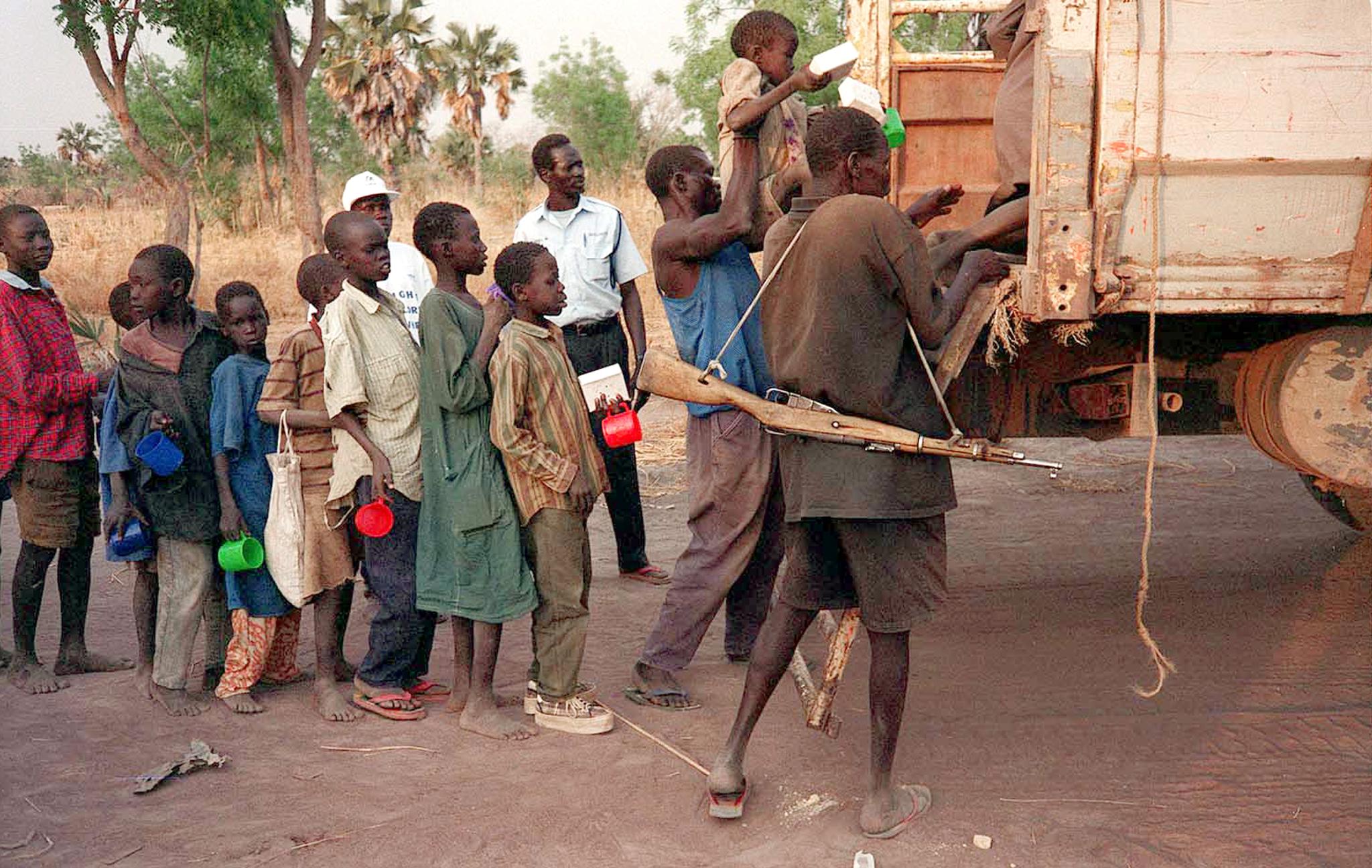
My uncle knew how far we had to walk but he tricked us, telling us that the place is nearby and pointing out some distant trees, saying that just behind that tree we would reach our destination. We would walk a long way and still we would not get there. But with his encouragement we managed to reach Camp Rhino in Arua District in Uganda six days later on 12 January 2000.
My uncle had already been living there for a year with my elder brother Victor Friday before he came to get me. I met up with my brother again at my uncle’s home in Rhino Camp. I was very happy to greet Victor again. We spent one month resting and then we walked for a day to reach the UNHCR base office in Arua town.
Here we were registered as refugees and a UNHCR truck took us back to the camp. Then my uncle registered me at a primary school. He advised me to study hard so that I could help our mother in the future. That is why he had taken the chance of taking my elder brother and I with him to Uganda. He would tell me: “You study hard to become a great person in future. I know you are bright in school do not let yourself down.” His father was a doctor in South Sudan and he knew education could take you to a better place.
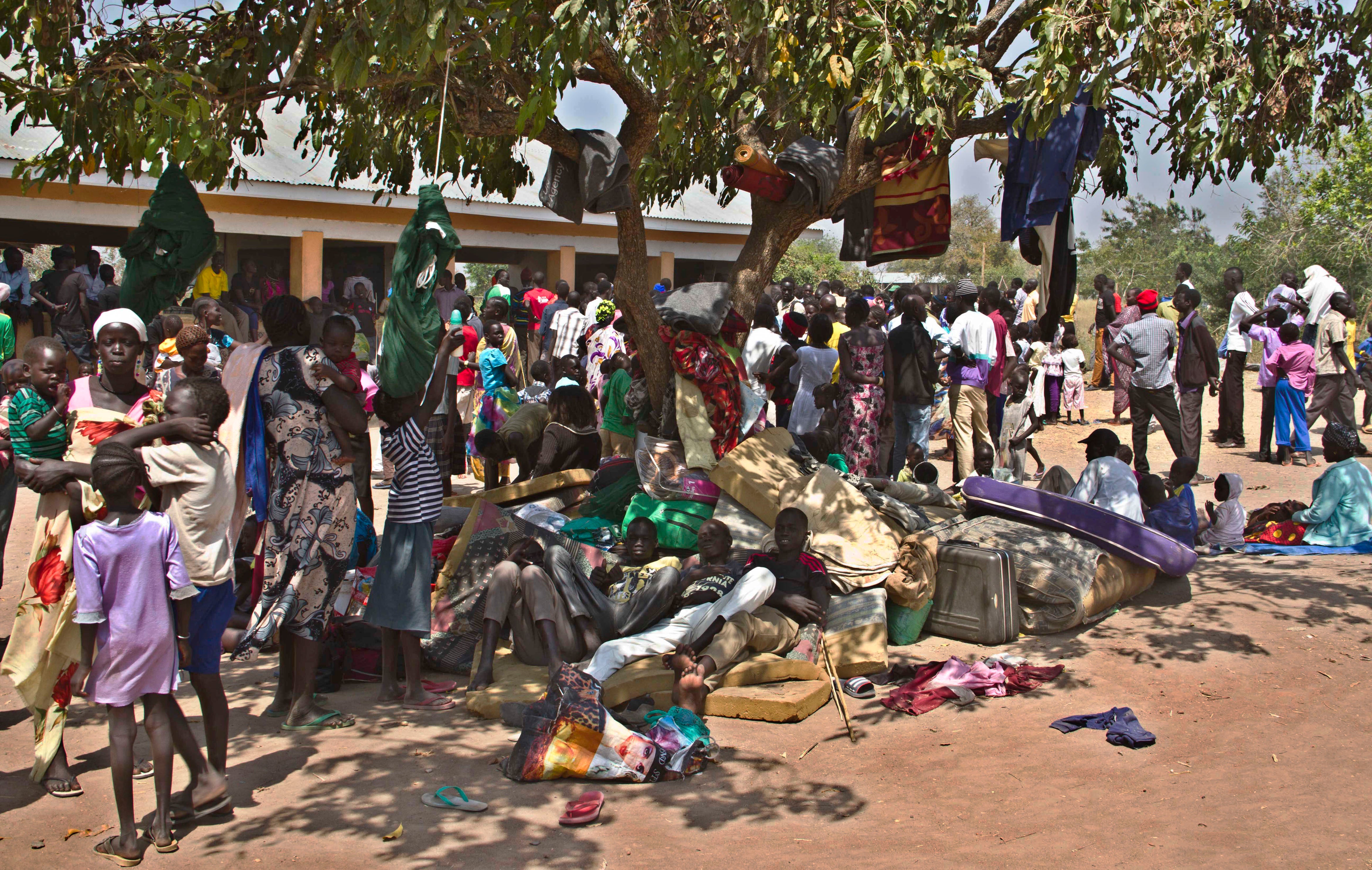
In Rhino Camp we lived in a mud brick house thatched with grass that my uncle had built. Our home was very basic. The UNHCR gave us cups and plates and a battered black saucepan. We had papyrus mats to sleep on and blankets to cover us. The World Food Programme gave us basic foodstuffs like maize, sorghum or millet, cooking oil and salt. We planted beans and white peas and my brother and I gardened together after school and at the weekends, planting and hoeing. In the market we bought ingenze, small silver fish which were sold in heaps. These taste good smashed and mixed with dry okra or pumpkin.
The main differences were that in the Congo the land was fertile. A little garden produced a lot and food was better. By the time I left most people were self-sufficient and did not need food from aid agencies. But in Uganda it was different. Here the land was not as fertile and people depended on food from the WFP.
But here the schools were much better. I was in grade 2 of primary school and my brother who was already 14 was in grade 3. I had missed my brother and it was good to meet him again and my uncle looked after us. He did casual labour for the Ugandan community and around the base camp and earned enough money to buy us some soap, a little extra food and our school uniform.
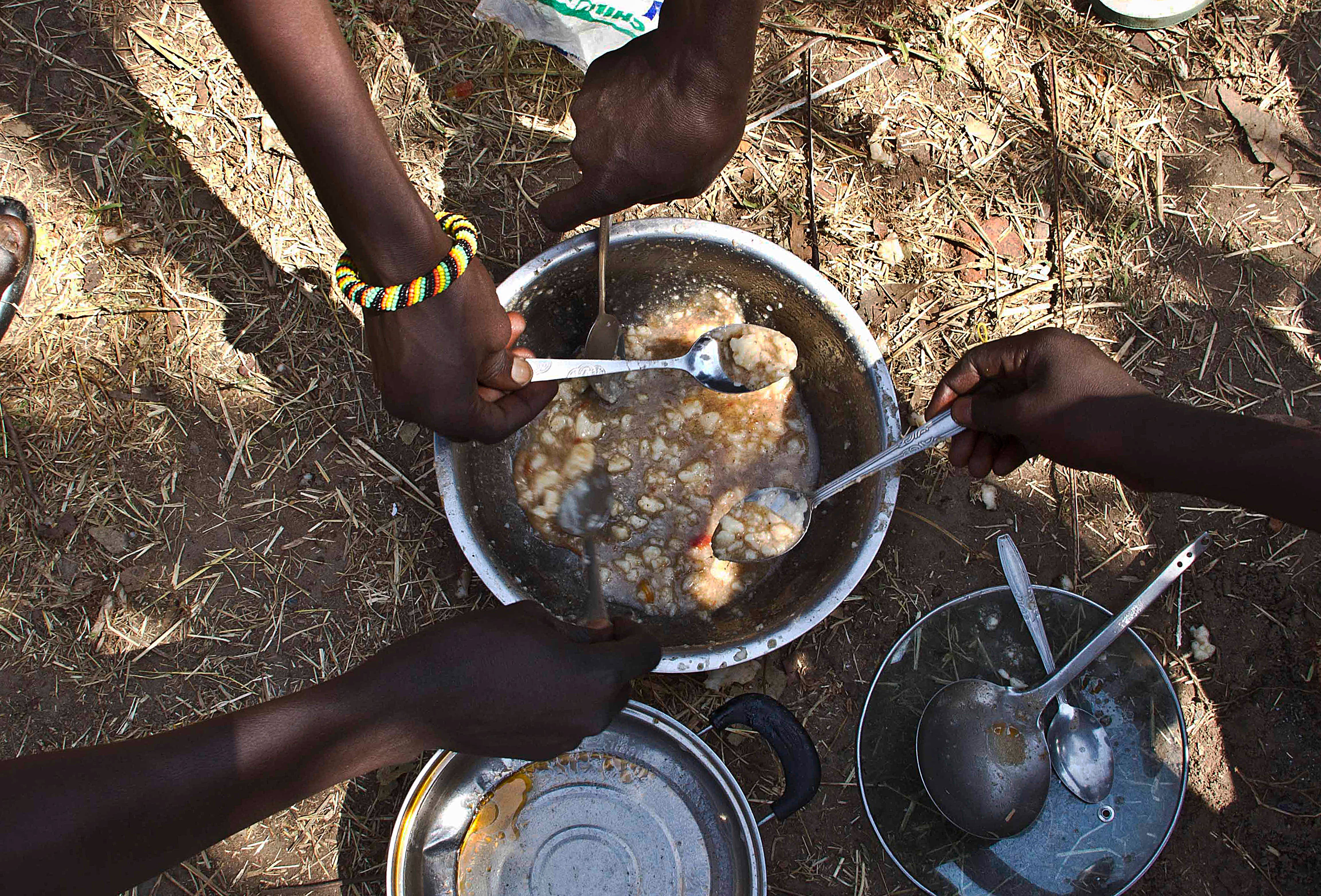
Eight months later a letter came from DRC to say our mother was seriously sick. My elder sister decided to go back to the Congo to take care of her. Some of my uncles from Sudan came to the Congo and took my mother, my elder sister and my other brother and sister back to Sudan.
At the end of August, as I came back from school very hungry and ready for something to eat, my uncle called me to him and read me a letter telling us that my mother had died in Sudan. I felt very sorry and sad with deep sorrow. I screamed and rolled on the ground. All the neighbours ran to see what had happened to me. When they realised that I had lost my mother they joined me in crying. The neighbours helped to hold a funeral and held prayers. After three days I started a new life of suffering – but that is another story.
One day Uncle Christopher said he wanted to go to Juba in search of money to pay our school fees. Peace in 2005 meant that it was possible to go back to South Sudan. Most refugees had not yet been officially repatriated but many went back to look for work as there were many opportunities in the new country. We all agreed.
Before I reached home I heard very heavy gun fire behind me. It was the soldiers I had seen at J1. They opened fire face to face and almost all died
A few months later an incident happened in Juba. An ammunition store busted in the air and the explosion killed many people. My uncle disappeared completely. His body was not found. I received the news in class from a student who arrived at the school late one morning.
I went home feeling hopeless and cried all day. I asked myself, “What is going on with our family? Both our father and our mother are gone and now our uncle. What is the matter with our family?” I just kept on asking myself such questions all day. But I got no answer.
It took two weeks but our friends and neighbours contributed and we organised a funeral for my uncle. Then I began a new chapter of my life.
In May 2016 the vice president Riek Machar returned to Juba and was given the position of first vice president.
On 7 July 2016 I gave a lift to a customer. We drove past the state house. They call it J1. A huge number of soldiers were standing by the roadside. On the right hand side they were in plain green uniforms and on the left side they were in a mixed coloured army uniform. The soldiers were fully armed with tanks around and heavy munitions. As we passed they didn’t say anything.
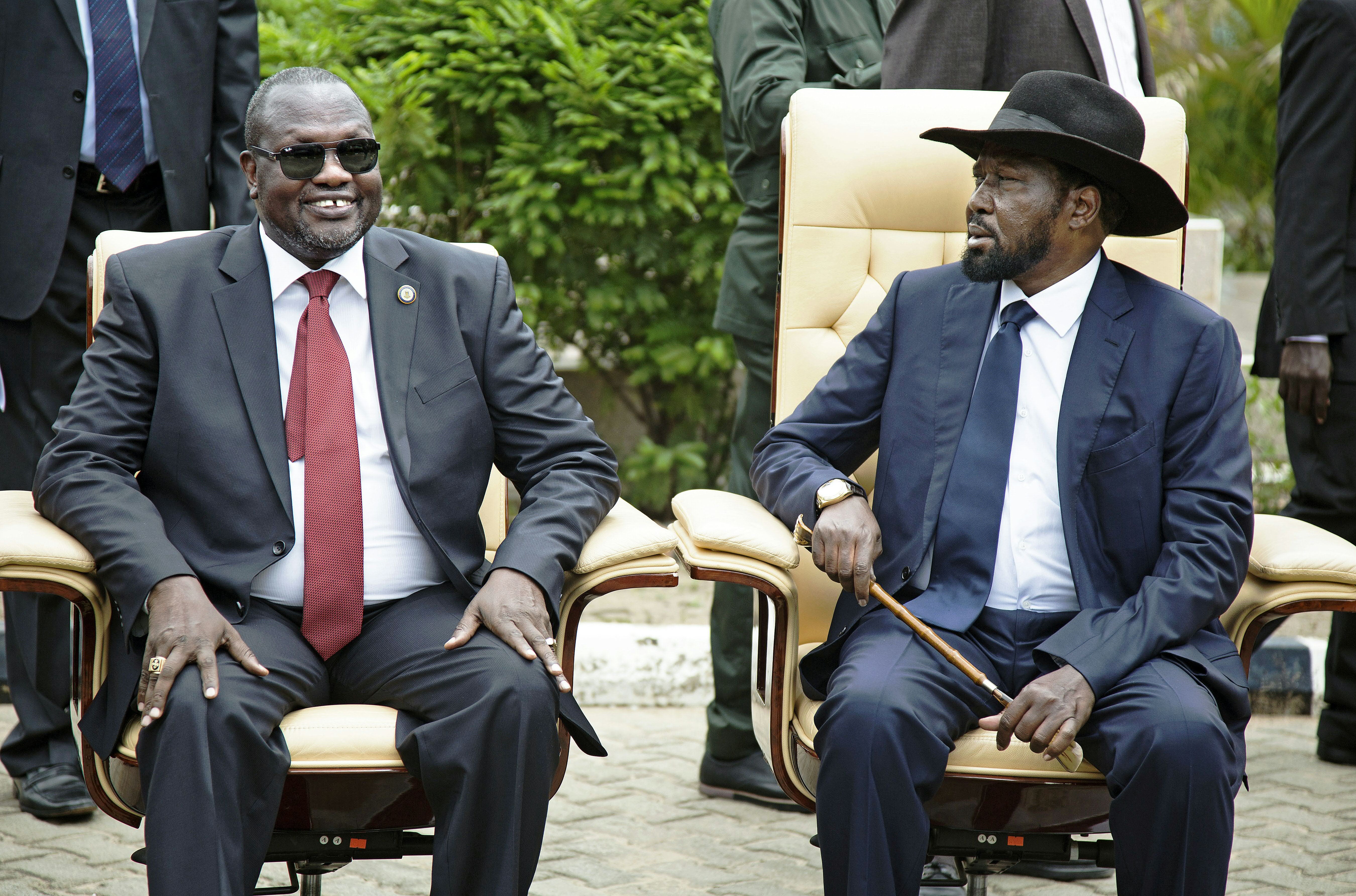
On my way back, after I had dropped off the customer, I asked myself, “What is happening with the state house?” And I couldn’t find an answer. When I went to pass J1 on the way back I was stopped and told to take another way. Then I realised there must be something serious happening. I decided to make my way home and on my way I met more soldiers loaded in trucks rushing at high speed towards J1.
The soldiers wearing plain green uniforms were for the first vice president and the others were for Salva Kiir, the president of South Sudan. Both leaders were in J1 for a meeting.
Before I reached home I heard very heavy gunfire behind me. It was the soldiers I had seen at J1. They had opened fire face-to-face and almost all died. There were very few survivors.
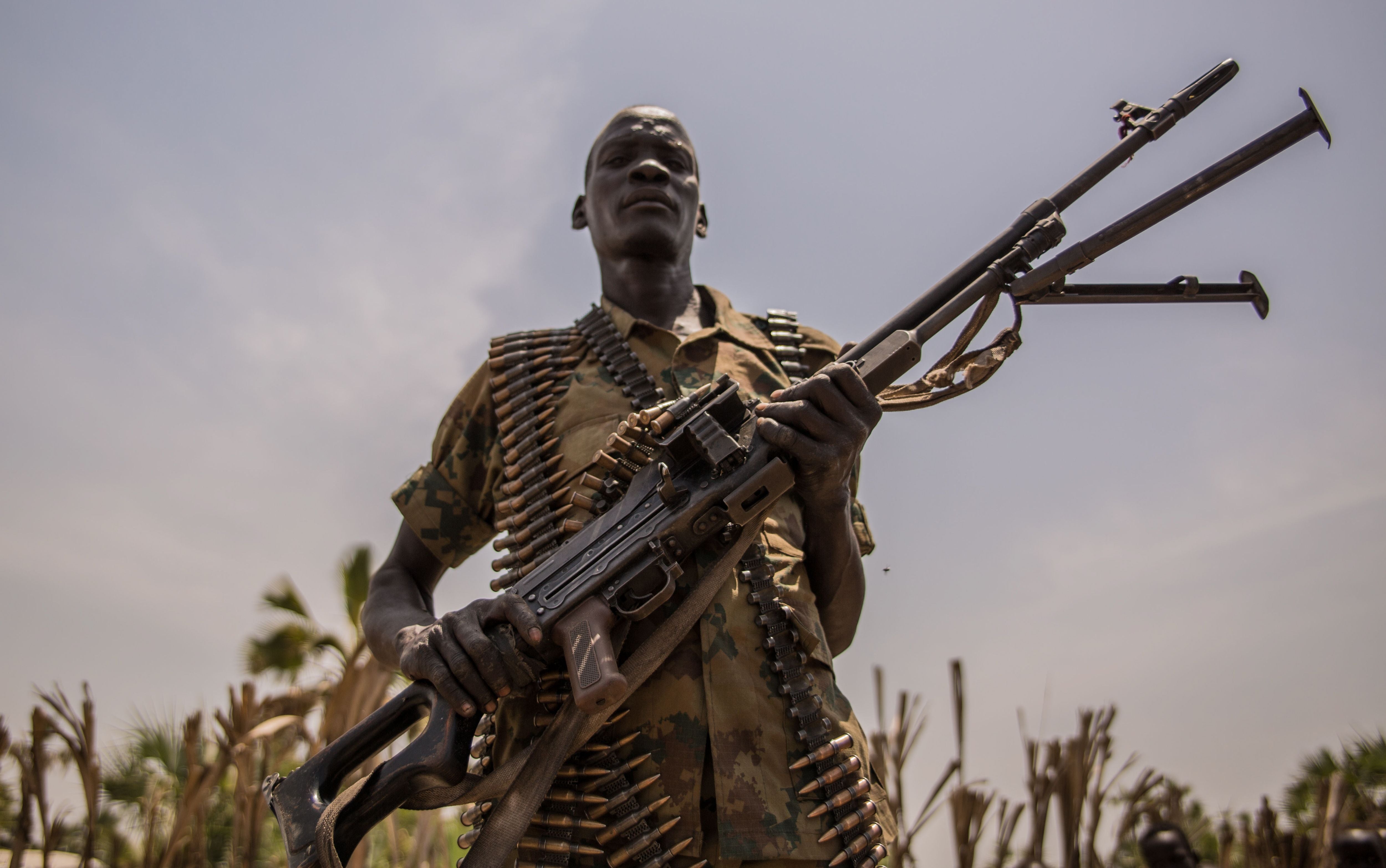
The next day the gunfire escalated until it was everywhere in the city. No one went to the markets. They were closed. Hospitals were not functioning any more, only the military hospitals, treating wounded soldiers. The mortuary was full of dead bodies.
After four days of serious gun fighting, Riek Machar left Juba for the second time and war spread all over most of South Sudan. That war killed thousands of citizens. Some died of hunger. There was an economic crisis. Prices rose very high. Things got so tough in the city. Life was threatening with unknown gunmen killing people at night. My life was not safe anymore.
People started running away but the roads were blocked. It was not possible to travel from Juba to my family in Yei. Only the route to Uganda was open. It was under the control of Ugandan soldiers who were keeping it safe for the many Ugandan citizens who lived in South Sudan. I called my wife, Janet, to tell her to make her way from Yei to Uganda and we would meet there. Then I set out on my journey from Juba to Uganda.
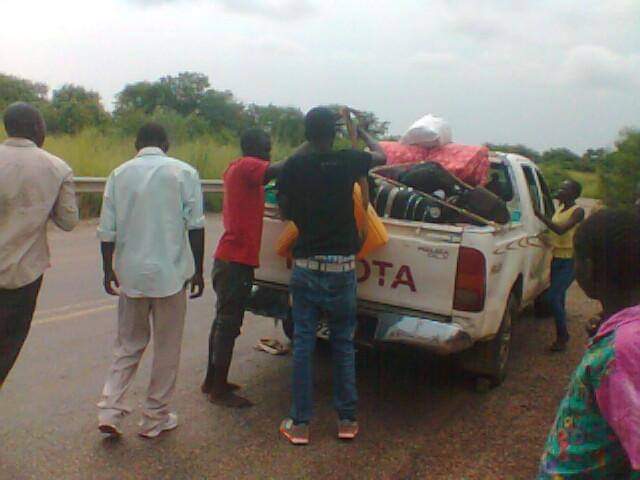
I bought a place in a truck. As we drove out of the city we saw dead bodies by the road side. We moved from village to village but we did not meet any one. All the houses were empty. We were all very afraid, praying to god that we would reach the border and get out and that the soldiers wouldn’t get us.
Just after one village we were stopped by some soldiers. They checked our vehicle and picked some money out of our pockets and let us go. As we left them we saw dead bodies around the road and some burned out military vehicles with guns on top of them. We were afraid.
When we arrived in a place called Elegu, the United Nations World Food Programme and UNHCR welcomed us. They offered us ready cooked food and gave each of us some biscuits. We were taken for registration then the following morning we boarded a truck to go to Bidibidi Refugee Settlement.
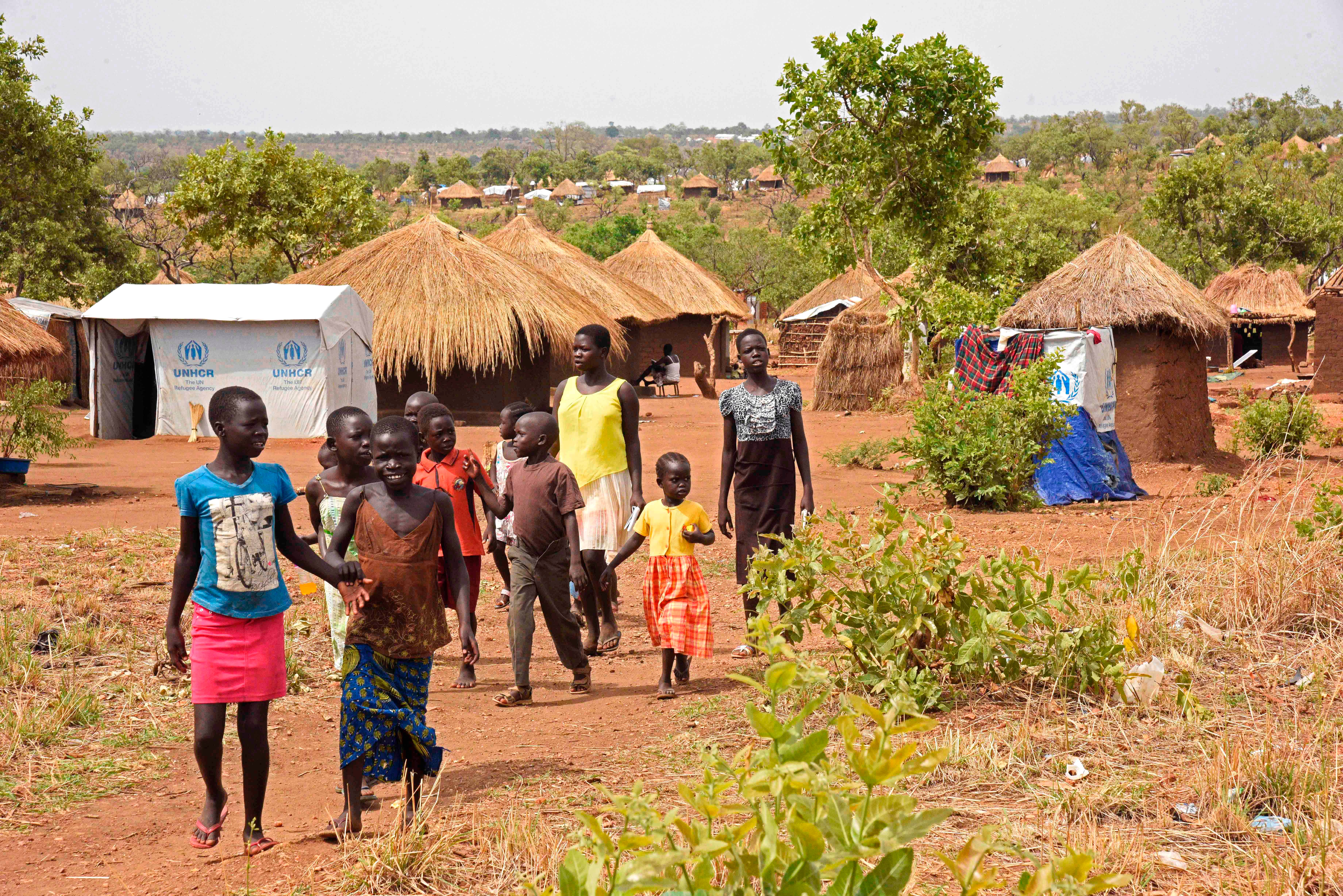
Each of us was given a piece of land to settle on and food items were given out and some other things and we started clearing the bush around us and put up some structures. The host communities came with lots of oranges for sale. We ended up exchanging flour and beans for oranges. I realised that there was no threat to me here. The UN wouldn’t put us in the wrong place. Life was normal here.
When we were dropped in the bush at Bidibidi I thought about my parents and how the same thing had happened to them. When they had to clear the bush in the Congo I was a child. I did not realise how hard it was for them. As I cleared the ground I thought about how my parents had been refugees and now I was back a refugee. I wondered, when will this stop?
The International Rescue Committee came looking for community health workers. I was not at home when they came to our house. I was out looking for customers for wooden seats I was making. But in my absence the people from my area elected me to be their Village Health Team representative.
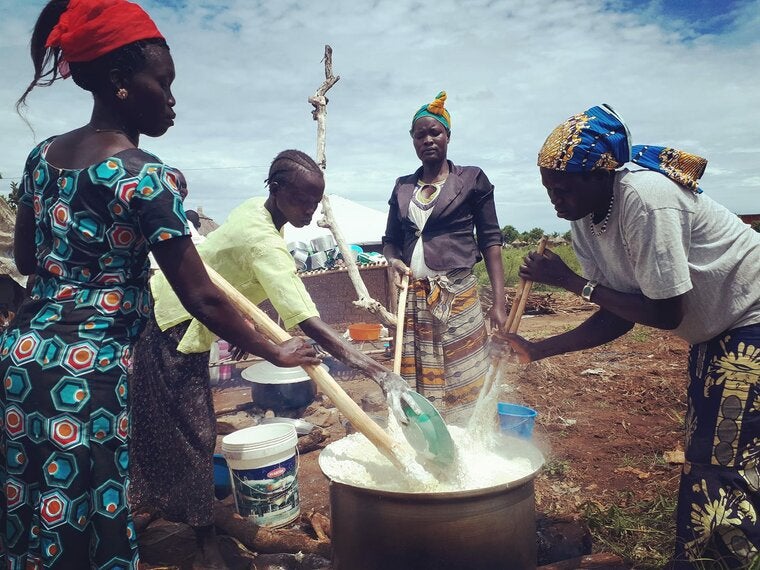
In 2018 the World Food Programme came and put up some adverts for storytelling training to train people to collect stories from the community in Bidibidi.
We travelled to a hotel called Lokopio in zone 2 of Bidibidi Refugee Settlement where we were given two weeks’ training. The first day of training was an introduction and we were given tips on taking pictures and shooting videos. It seemed as if it was something I already knew but I enjoyed it. The first week our facilitators were a Ugandan female activist and journalist called Rosebell Idaltu Kagumire, and Hugh Rutherford, an Australian photographer and cinematographic activist. I loved their facilitation. They taught us how to write a short story caption and take a good photo and video.
In two weeks the WFP held an inauguration day. Benson, a song writer and producer from Europe, came to be our special guest to inaugurate us. They issued us our certificates and Gioacchino from the WFP promised us smartphones. The ceremony was live-streamed on Facebook and Hugh told me to stick to storytelling and that I am fit to be a storyteller.
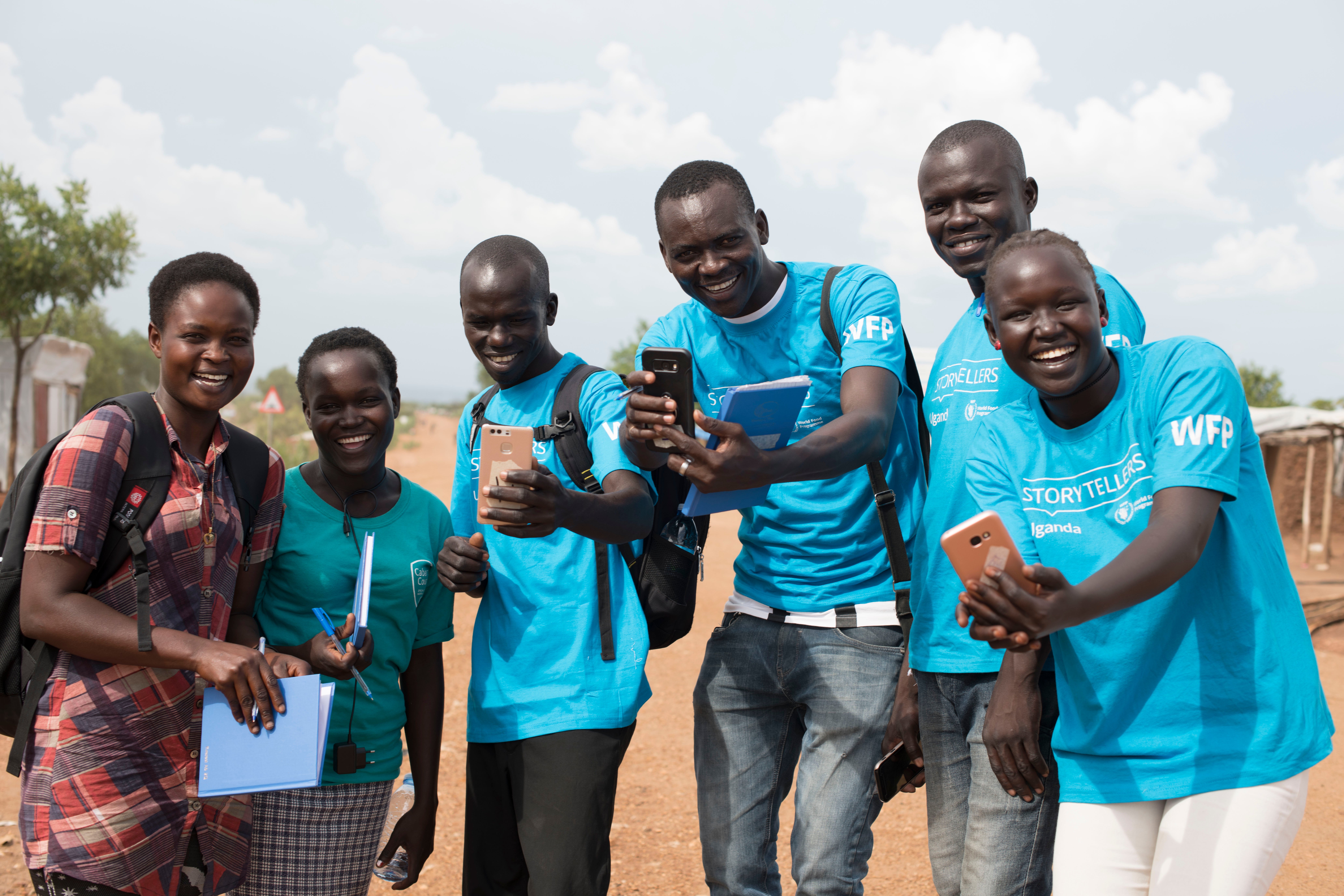
Straight away I started sharing stories on a Facebook group created for the WFP Storytellers project, called Bidibidi Storytellers. A month later the smartphones arrived and eventually I was given a brand new Samsung Galaxy A5. I made good use of the phone, sharing a lot of refugee stories. I wanted to tell the refugee’s untold stories so that the world will know what it actually means to be a refugee. One day I received a call from BBC London. They interviewed me about life in the camp and asked how I became “the voice of the voiceless”. They asked if they could come to Bidibidi to find some stories with me. Journalists from London were sent and we moved around the settlement capturing refugee stories. I decided to create my own personal Facebook blog called Daily Refugees Stories, where I shared all my posts.
From 2019 to 2020, I kept on building up my capacity. These things all gave me a platform for my own idea: to open a community-based organisation, the African Youth Network, which focuses on youth unemployment in the settlement. During the Covid-19 pandemic, lots of young people had nothing to do. They would lounge around the settlement, chewing bubble gum with mariungi (a narcotic leaf) and drinking alcohol. My vision is to help create a brighter future for them.
In early 2020, I was invited to attend the World Economic Forum. I spoke on behalf of refugees worldwide, which was a great experience for me. I shared my life experience of being a refugee – I have been wrongly imprisoned, suffered my abusive uncle, been separated from my wife and children. But in telling stories to others I hope I have also inspired.
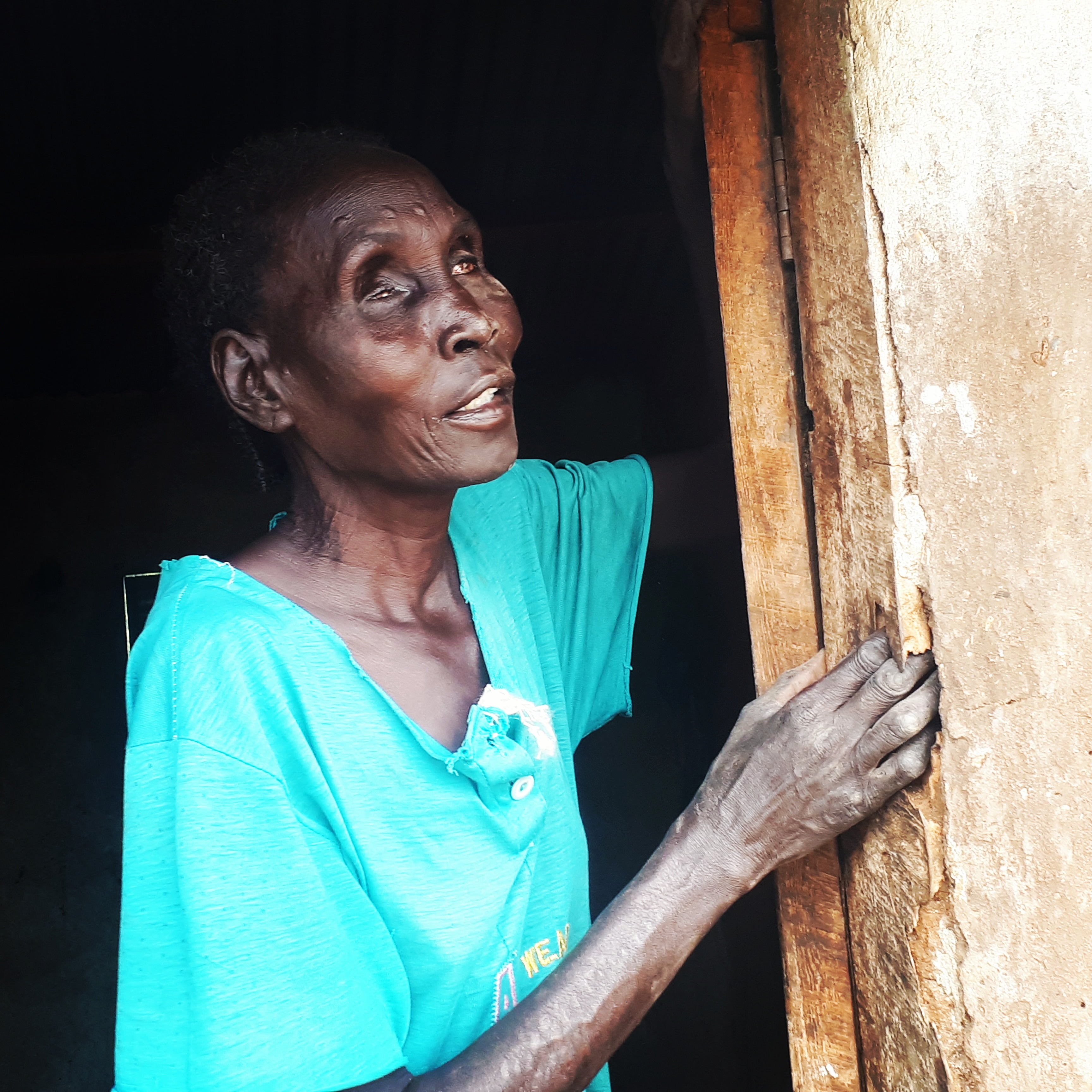
At an online event, I gave my opinion about what kind of immediate support refugees need and the importance of food for refugees. Later in the year, I also participated in the World Food Programme’s Nobel Peace Prize celebration – the organisation was awarded the prize in October for highlighting the cyclical relationship of conflict and hunger. I spoke with the movie actor Chiwetel Ejiofor about how conflict affects people globally and what peace means to refugees.
People don’t understand how it is to be a refugee – as world leaders gather for G7 and another World Refugee Day approaches on 20 June, perhaps it is time for the world to hear our voices. Many people don’t understand what conflict feels like. They have just watched it in a movie. Refugees are people who have really experienced it. You leave your country. You run for asylum. You don’t have enough land to cultivate your food like in your homeland. Living in a refugee camp, they find it hard to generate an income. You have no salary. You have no way of making money. But, with support, you can also land on your feet. I’m a living testimony to that.
Join our commenting forum
Join thought-provoking conversations, follow other Independent readers and see their replies
Comments